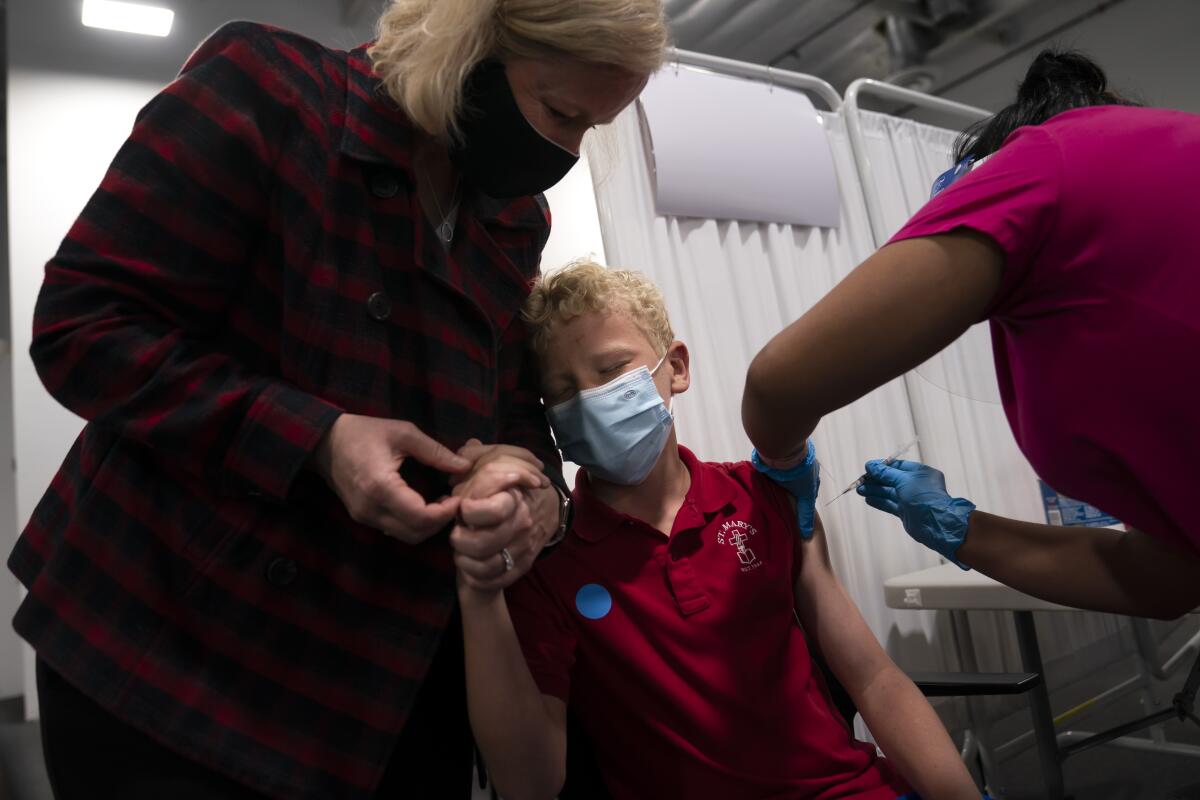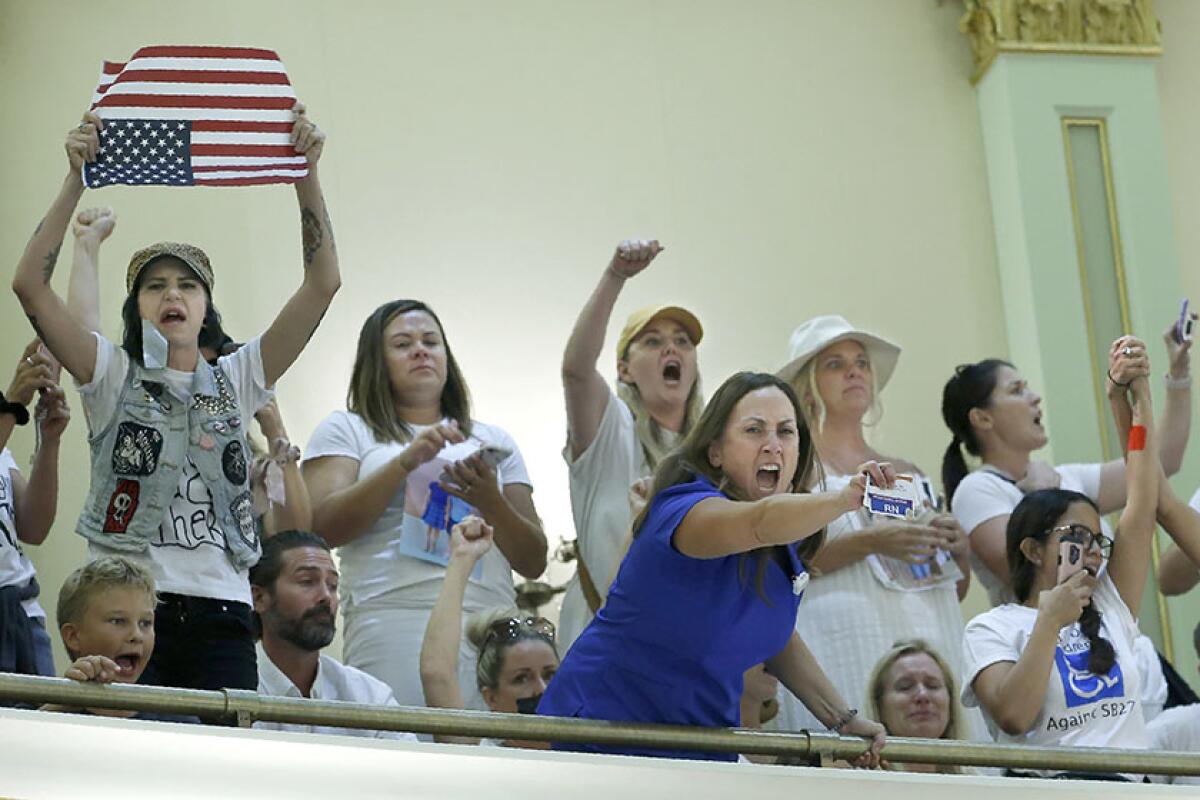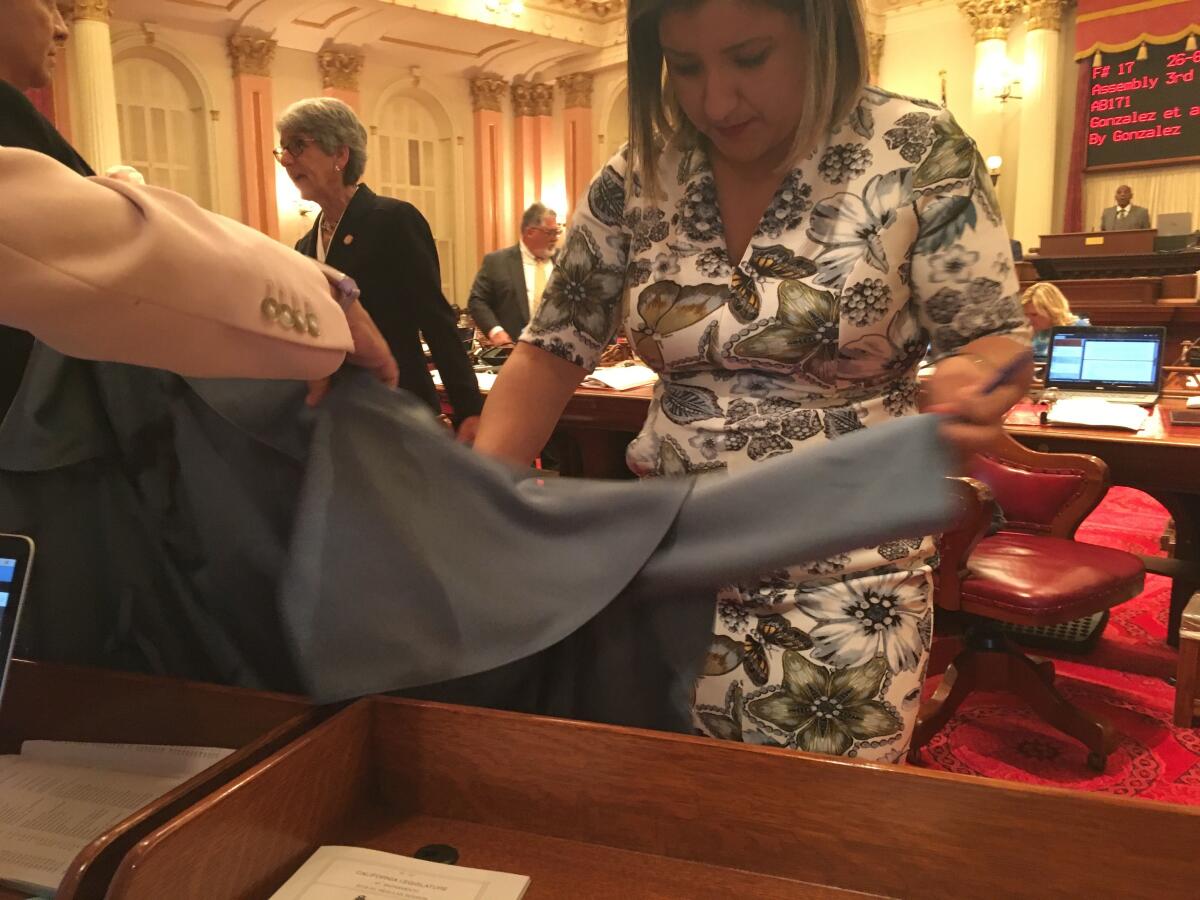California Politics: Legislators face new threats in familiar vaccine fight

- Share via
SACRAMENTO — In the waning weeks of the legislative session, state Sen. Scott Wiener is making his case to hesitant Democrats in the Assembly to pass a bill allowing minors to consent to vaccines without a parent’s permission. Outside of the Capitol, the San Francisco Democrat is helping prosecutors make their case against a man accused of threatening to kill the senator for authoring the bill.
Wiener said he may be called to testify next month against a San Ramon man who has been charged with six felonies for criminal threats against a state official, possession of assault weapons and carrying a concealed firearm, according to Contra Costa County court records.
It wasn’t the only death threat Wiener received this year. His San Francisco home was searched in June after his office received an email that said, in part, that there were bombs at the senator’s house and that he “will die today.”
Wiener is nonchalant in describing the threats. He knew they were coming as soon as he decided to author a vaccine bill. And I knew as soon as he told me about Senate Bill 866 in January.
At the start of this session, a handful of Democratic lawmakers announced they were forming a Vaccine Work Group that would introduce legislation to improve vaccination rates and reduce COVID-19 misinformation. Two of the most far-reaching bills, which would have created mandates for the COVID-19 vaccine for employees and schoolchildren, were shelved earlier this year.
Wiener’s bill is now the most controversial vaccine bill remaining.
Senate Bill 866 would allow children 15 and older to be vaccinated, including against COVID-19, without a parent’s consent or knowledge. The legislation initially sought to allow children as young as 12 to make the decision, but Wiener said it was clear the bill would not pass in the Assembly unless he raised the age.
Wiener said he believed 12 years old was the appropriate age since that’s when the state currently allows minors to make reproductive healthcare decisions, such as obtaining the human papillomavirus and hepatitis B vaccines.
Vaccine consent laws vary across the country. In Oregon, minors 15 and older are allowed to get vaccinated without parental consent.
Opponents have argued that the bill would interfere with a parent’s right to choose what’s best for their child and that, in the case of a rare serious reaction, could lead to a delay in treatment if the child does not disclose they were vaccinated.
The Legislature has until Aug. 31 to pass SB 866. If passed and signed by Gov. Gavin Newsom, the bill would go into effect Jan. 1, 2023.
Wiener said he is still working to garner enough votes in the Assembly, which has more moderate Democrats who could face political backlash in the November election for voting for the bill.
“We’re making the case and trying to get to 41 votes,” Wiener said.
That year, a bill to create sweeping new restrictions on vaccine exemptions for schoolchildren prompted near-constant protests inside the building.
Opponents blocked entrances to the statehouse, shut down legislative hearings and lined the corridors of the state Capitol so densely that the hallways became humid.

That year an anti-vaccine activist livestreamed himself assaulting Sen. Richard Pan (D-Sacramento), the author of SB 276, which restricts vaccine medical exemptions. Then, on the final night of the legislative session that year, a protester threw blood at senators from the visitors gallery.
Rebecca Dalelio pleaded no contest to felony vandalism and was sentenced in May to two years of formal probation and four days in county jail. She was also ordered to stay away from the Capitol and pay $71,000 in restitution to the Senate for the cost of cleaning and disinfecting the chamber.
Sen. Melissa Hurtado (D-Sanger) said it’s a moment that will live with her forever. The blood, which was from a menstrual cup thrown by Dalelio from the balcony, splattered Hurtado and nine other senators.
“I was in shock,” Hurtado said. “And I was like, I don’t know what’s going on and I didn’t know what to do. ... My thought at the moment was like, ‘I gotta go into the shower.’”

Hurtado said when she learned this year that one of her bills was being targeted by anti-vaccine groups, she grew leery about what it would mean for her safety and that of her staff. SB 920 would allow the Medical Board of California to consider victim statements in its decision-making and would make it easier for board investigators to access patient records. Some opponents argued that the bill would help the medical board investigate anti-vaccine doctors.
Hurtado said she held the bill after learning that there was a caravan of anti-vaccine protesters headed to the Capitol and that her bill was among those they opposed. She said she thought about the 2019 chaos in the state Capitol and the violent attack last year on the U.S. Capitol.
“I just decided to hold it because while we didn’t receive any death threats or anything of that sort, I felt like I didn’t want to take that risk,” Hurtado said. “And I felt that I needed some more time to educate individuals that this is not what they think that it is.”
While Wiener’s bill is the highest-profile of the vaccine legislation remaining this year, several others are also moving forward in the final weeks of the legislative session. Assembly Bill 1797 by Assemblymember Akilah Weber (D-San Diego) would make it easier for schools to verify student vaccine records. Assembly Bill 2098 by Assemblymember Evan Low (D-Campbell) would strengthen the Medical Board of California’s ability to discipline doctors who promote COVID-19 misinformation by classifying it as unprofessional conduct.
Senate Bill 1479 by Pan would require the California Department of Public Health to coordinate and provide support to schools-based COVID-19 testing programs for teachers and students.
The three bills are awaiting votes in appropriations committees in both houses after having been placed on what is known as the “suspense file.” That designation means the fiscal committees in the Assembly and Senate will vote next week in rapid-fire style without disclosing how each lawmaker voted.
Enjoying this newsletter? Consider subscribing to the Los Angeles Times
Your support helps us deliver the news that matters most. Become a subscriber.
—
Stay in touch
Did someone forward you this? Sign up here to get California Politics in your inbox.
Until next time, send your comments, suggestions and news tips to capolitics@latimes.com.
Sign up for Essential California
The most important California stories and recommendations in your inbox every morning.
You may occasionally receive promotional content from the Los Angeles Times.







